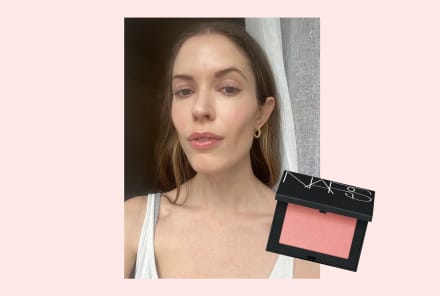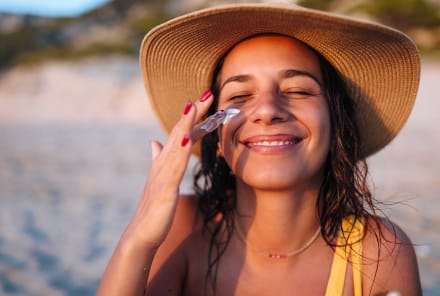Advertisement
How To Naturally Manage Dry & Inflamed Scalp Psoriasis


Have you ever noticed scaly red patches on your scalp? If so, you may be among the 2 to 3% of Americans with psoriasis, an autoimmune disorder that presents itself on the skin, as well as in the joints. And if you've ever experienced this type of flare-up on the scalp, you know it can be quite the challenge to learn how to live with it, while not allowing it to control your every hair move. We consulted with experts to get the lowdown on scalp psoriasis and the natural remedies you can take to help manage your condition.
What does scalp psoriasis look like?
It can be challenging to decipher the difference between standard-variety dry scalp, dandruff, and psoriasis. According to trichologist Eva Proudman, it's best to visit an expert for an accurate diagnosis, but there are some telltale signs to self-diagnose at-home.
For starters, if you're experiencing a scalp that feels tight and itchy with small, dry flakes of skin in the hair and your hair is dryer than normal, you most likely have a dry scalp. If you see flakes that are small white or gray scales that fall onto your clothes, but your scalp looks and feels oily, chances are you're dealing with dandruff.
Now if you've checked those two boxes off the list and you're still wondering if you have scalp psoriasis, Proudman suggests checking for circular, uniform areas of darker, redder skin that is visibly a different color from the rest of your scalp. If these patches are covered with dry, whitish-silver scales and cannot be easily removed, that is a sign of psoriasis. This is especially true if you remove the scales and see bleeding points on the scalp.
"Sufferers of scalp psoriasis report itching, tight uncomfortable scalp sensations, and often the knees and shins are also affected," Proudman says. Bottom line: Psoriasis patches are attached to the scalp (meaning they don't flake off in the same way that dry skin and dandruff might) and often raised with a rough texture. It's not flaky or loose and often has scales that aren't easy to remove.
What are the causes?
We still don't understand what exactly causes scalp psoriasis at a baseline level. What we do know is that psoriasis is an autoimmune condition that often runs in families (it is not contagious) and is characterized by flare-ups that can be triggered by stress, skin injury, infection, weather, as well as certain medications like lithium and antimalarials. (If you suspect your medication is triggering flare-ups, do not stop taking said medication; consult with your doctor about what to do instead.) We also know that those patches are caused by an internal inflammatory response. It goes something like this: White blood cells overproduce cytokines, signaling molecules that regulate your body's immunity and inflammation response, which trigger inflammation in the skin. The inflammation, for some reason, causes an abnormally fast multiplication of keratinocytes, the main cells in the outer layer of the skin. And thus you'll see raised, scaly patches of skin.
How can you care for it naturally?
While there is no cure for scalp psoriasis, there are various approaches you can take to help manage it. The most important factor in managing it, and the throughline for all the below approaches, is tempering inflammation:
Eat a low inflammation diet.
Since one aspect of psoriasis is inflammation, finding ways to reduce and control inflammation can help to keep the condition manageable. There's also initial research that suggests psoriasis is a condition that may be characterized by a leaky gut1 (learn more about the concept of "leaky gut" here). Proudman suggests avoiding processed meats and processed foods high in sugar, salt or fat. "Eating anti-inflammatory foods such as fresh fruits and vegetables decreases inflammation and oxidative stress," she says.
Austin-based holistic doctor Elena Villaneuva, D.C., confirms there is a direct connection between diet and inflammation2. "There is a major connection between gut health and skin health," Villaneuva says. "We've found that the key to reversing most skin conditions is to start on the inside." She recommends avoiding gluten, sugar, and dairy altogether—as research has shown a connection between these foods and psoriasis3.
Boost omega-3s.
Many studies have supported the use of omega-3s for easing psoriasis symptoms; in fact, this review has identified 15 human studies that all point3 to using it as part of a holistic treatment plan. It helps manage psoriasis symptoms4 including skin reddening, itching, scaling, and inflammation. "Omega-3s are linked to decreasing overall inflammation," Proudman says. "Oily fish like salmon, sardines, trout, and cod are all good sources." You can also opt for fatty acids in oils such as olive, coconut, flaxseed, or safflower.
Use an apple cider vinegar rinse.
Apple cider vinegar is a do-it-all ingredient, and when used as an apple cider vinegar rinse, it can help lower the pH of the hair, giving you the silky, shiny locks you've always wanted. Villaneuva says it's a great natural at-home remedy to alleviate itching and irritation. "Apply an apple cider vinegar rinse to the scalp and wait for it to dry," she suggests. Once the vinegar has dried, rinse the solution off of the scalp. However, only use this on mild flare-ups: "You'll want to avoid using apple cider vinegar if your skin is cracked, bleeding, or there are open wounds." This is safe to repeat a few times a week to reduce irritation.
Try aloe vera.
If you find that your psoriasis feels tight or itchy, try using aloe vera to help soothe itching and flaking. The gel found inside the aloe leaf is known for its healing properties. For psoriasis specifically, one double-blind, placebo-controlled study shows that using aloe as a topical ingredient could help manage the condition5 with no side effects. Proudman says to be sure to use it regularly to see full results: "[It takes about] three times a day for up to a month to see or feel the effects," says Proudman.
Make hair care product swaps.
Villaneuva suggests opting for products that are free of sulfates, phthalates, and parabens. "These ingredients will dry out the skin, which causes further irritation to the scalp," she warns. Instead, look for ingredients like coconut oil, tea tree oil, turmeric, avocado oil, castor oil, and charcoal. All of these ingredients help to reduce inflammation and remove impurities to balance out the condition of the scalp.
Villanueva's go-to for immediate relief is a DIY paste made with oats and water. "If you need immediate relief, you can make a paste with crushed oats and water and apply it directly to the skin," she says. "This will not stop the progression of psoriasis, but it will help to temporarily relieve the scalp as oats are extremely soothing to the skin."
The bottom line.
Even though scalp psoriasis is not curable, there are quite a few natural options you can take to help manage inflammation at home. For example, try adjusting your diet and choosing healthy hair care products. As always, visit a dermatologist, too, to get professional help.
Watch Next
Enjoy some of our favorite clips from classes
Enjoy some of our favorite clips from classes
What Is Meditation?
Mindfulness/Spirituality | Light Watkins
Box Breathing
Mindfulness/Spirituality | Gwen Dittmar
What Breathwork Can Address
Mindfulness/Spirituality | Gwen Dittmar
The 8 Limbs of Yoga - What is Asana?
Yoga | Caley Alyssa
Two Standing Postures to Open Up Tight Hips
Yoga | Caley Alyssa
How Plants Can Optimize Athletic Performance
Nutrition | Rich Roll
What to Eat Before a Workout
Nutrition | Rich Roll
How Ayurveda Helps Us Navigate Modern Life
Nutrition | Sahara Rose
Messages About Love & Relationships
Love & Relationships | Esther Perel
Love Languages
Love & Relationships | Esther Perel

















